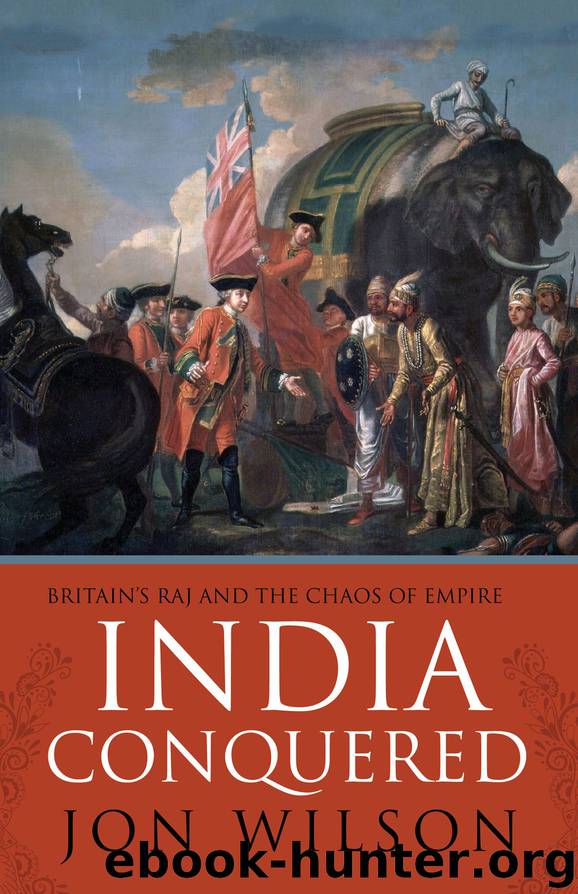India Conquered by Jon Wilson

Author:Jon Wilson [Wilson, Jon]
Language: eng
Format: epub
ISBN: 9781471101274
Publisher: Simon & Schuster UK
10
THE LEGALIZATION OF INDIA
Albert Edward, Prince of Wales, visited India in 1875. With a retinue of a dozen doctors, journalists, churchmen and lords, he hunted and dined through every part of India with splendid self-confidence. A year later Queen Victoria had herself officially declared Kaisar-e-Hind, Empress of India. In 1877, an elaborate ceremony was held in the old Mughal capital of Delhi to confirm the new title. With these acts, officials said, ‘the union of India with England has been asserted to be indissoluble’.
Motivated more by Britain’s status in Europe than the administration of India, the new pageantry was very shallow. Beneath their new elaborate costumes, the British officers charged with the day-to-day administration of India were still gripped by panic. Twenty years after Britain had reconquered the northern provinces of India, the imperial bureaucrats who ruled India were newly fearful about the security of their regime.
There was paranoia on India’s borders, which led to war against assertive neighbours in Afghanistan and Burma. There were new concerns about internal resistance, where memories of the mutiny gave imperial officials a heightened sense of their insecurity. The murder of two British judges in the late 1860s persuaded British officers that ‘sources of anxiety’ were very real. Bureaucrats saw seditious conspiracies everywhere, blaming them on the ‘fanaticism’ of Muslims and the hostile ‘national sentiment’ of Hindus. Muslim radicals were incarcerated, tortured and convicted of waging war against the Queen, despite thin evidence. At the same time, British officers started to note the emergence of new political associations organizing in the urban centres of the subcontinent from Lahore and Dhaka to Madras.
Western India was the area of greatest worry. Two developments particularly concerned the British.
The first was the birth of the Pune Sarvajanik Sabha, an organization founded in 1870 by a group of men who wanted to voice criticism within the institutions of the imperial regime, led by the judicial officer and social reformer Mahadev Govind Ranade. Born in 1842 to a family of Brahmin government officials, Ranade was one of the first students to be educated at the University of Bombay. He started off as a fervent critic of British rule. Ranade’s scholarship was suspended after he wrote an essay saying India was better off before the British conquest. Throughout his life, he sought to revive the ‘national’ spirit of self-rule he saw in Shivaji’s Maratha state; Ranade wrote a history, the Rise of the Maratha Power, which attributed its growth and survival to popular patriotic sentiment. But Ranade’s celebration of India’s past was increasingly coupled with a clear sense of the opportunities that lay open in modern, British-ruled India. If they were ‘roused’ by institutions articulating their voice and left for the most part to rule themselves, Ranade thought there was scope for ‘the mass of the people’ to flourish under British sovereignty. He compared the British conquest in India to what he saw as William the Conqueror’s beneficial invasion of England in 1066.1
His style of critical loyalism did not prevent British officers from suspecting that Ranade supported violent opposition to British power.
Download
This site does not store any files on its server. We only index and link to content provided by other sites. Please contact the content providers to delete copyright contents if any and email us, we'll remove relevant links or contents immediately.
| Central Asia | Southeast Asia |
| China | Hong Kong |
| India | Japan |
| Korea | Pakistan |
| Philippines | Russia |
The Sympathizer by Viet Thanh Nguyen(4386)
The Rape of Nanking by Iris Chang(4205)
World without end by Ken Follett(3475)
Ants Among Elephants by Sujatha Gidla(3463)
Blood and Sand by Alex Von Tunzelmann(3198)
Japanese Design by Patricia J. Graham(3167)
The Queen of Nothing by Holly Black(2588)
City of Djinns: a year in Delhi by William Dalrymple(2555)
Foreign Devils on the Silk Road: The Search for the Lost Treasures of Central Asia by Peter Hopkirk(2463)
India's Ancient Past by R.S. Sharma(2451)
Inglorious Empire by Shashi Tharoor(2437)
Tokyo by Rob Goss(2427)
In Order to Live: A North Korean Girl's Journey to Freedom by Yeonmi Park(2387)
Tokyo Geek's Guide: Manga, Anime, Gaming, Cosplay, Toys, Idols & More - The Ultimate Guide to Japan's Otaku Culture by Simone Gianni(2370)
India's biggest cover-up by Dhar Anuj(2351)
The Great Game: On Secret Service in High Asia by Peter Hopkirk(2345)
Goodbye Madame Butterfly(2251)
Batik by Rudolf Smend(2179)
Living Silence in Burma by Christina Fink(2068)
